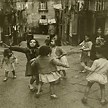
Amerika 2015
There is a widening perception in the country that the American Dream is a tattered and fraying garment slipping quickly from our shoulders. Parents now struggle to believe that their children will do better than they did. Instead they worry about whether their children will do at all. Jobs are disappearing, wages falling. Even a college education seems to no longer be a guarantee of a well-paid job, but more often only of a persistent and nagging debt. That glorious, naïve post-World-War-Two belief that it would always just get better seems to have disappeared in an elusive puff of smoke.
Yet, I am here to tell you that it isn’t so. The American Dream is alive and well and abroad in the land. I have seen her there moving stealthily amongst the gathering shadows.
Case in point: let us call her G.
She arrived at the age of eight from the ten-island nation of Cape Verde speaking, like her mother and younger brother, no English at all. To this day I remember the stunned look upon her face when I met her on the afternoon of her first day of third grade. Her expression told the sorry tale of all the absurd things she had imagined about a life in America having in one day been squashed by the brutal reality of being the one who couldn’t understand what was being said or what she was supposed to do.
Her family lived a few streets over from the school, in the top-floor apartment of a three-tiered multi-family home that had been built many decades before for the brass mill workers when there were still working brass mills at the bottom of the hill. The house was on a street plagued by gangs and shootings, as all the streets around it were and still are, a street where it’s better to be inside after a certain hour.
G. struggled with English. The sounds of the new language were very different from the Portuguese-Creole she spoke at home. Slowly, however, little by little, she started to get the hang of it, and after a few years at our school, she was considered to be one of our more promising students. Her mother, too, when she came to conferences, had begun to speak more English. She no longer required her daughter to translate for her. G. graduated from fifth grade with honors and went on to junior high school.
A year or so later, there came a move, a move to a two-family home in a city to the south of us, a house that was in a better neighborhood next to a park. You were very conscious, when you went there to visit that the family had moved up in the world. G.’s mother’s boyfriend, who owned the house, and who she later married, had a steady job laying pipe. G.’s mother was now a registered CNA. Both children who were in school (there were now two additional little ones) were doing well.
This house, however, was not in such a good neighborhood that it got G. out of attending an inner-city high school. She attended the toughest one in the city, in fact, a school plagued by gangs and violence, under-funding, high teacher-turnover etc. She walked through metal detectors every morning and afternoon. She knew students who had been shot or killed. Yet she triumphed over these circumstances as well, graduated salutatorian of her class, became an American citizen, and got into a small, selective, private college on scholarship.
In the last months of her final year of high school, the family was doing well enough to move again, this time to a town and to a neighborhood that looked very much like my childhood neighborhood. In fact, it looked better than my childhood neighborhood on the South Shore of Long Island. Each raised ranch or split level near G.’s new house had a large, lush lawn wrapped around it. It wouldn’t help G., since she was going to finish out her high school in the inner-city, but her younger brother and sisters would now be attending suburban schools.
When you went to visit this third house, the fact of the family’s rise in the world was profoundly obvious and also profoundly moving. There would be no gangs or shootings here. The children had a yard to play in. They could play outside well into the evening without having to worry about stray bullets. They could go to a school that was not struggling against impossible odds.
Yet I held my breath, too, for the fact was that the family had now crossed a border, the “invisible” border that is so completely, glaringly visible in America in the early twenty-first century. They had moved from a world primarily, almost solely, populated by people of color, to the world of white people. I do not know if they were the first or the only family of color in this neighborhood. Perhaps they were both, but I was mightily relieved, more than I ever admitted to her, when G. told me that their new neighbors had come over to welcome them to the neighborhood, and they had brought cookies.
That was a-year-and-a-half ago.
About a week before Christmas, I went over to wish them Happy Holidays. The house was decked out: a sumptuous tree, lights on the stone mantelpiece, cards. We teased the dog in his festive Christmas sweater. G. had just gotten home from the first semester of her sophomore year of college. She was confident about how she’d done on her final exams and papers. Her younger brother, who is now taller than I am, emerged from his room to tell me he was doing well in the suburban high school he now attended. He showed me the picture of the soccer team he had played on in the fall. Of course, I had no trouble picking him out.
“How many kids of color are there in your high school?” I asked.
He tallied in his head, “Eight in the freshman class.”
“Is that including you?” I asked and we all laughed.
But eventually, as the pleasant chit-chat flagged, they got around to telling me what had happened the day before.
G.’s step-father had had a few friends over to celebrate his birthday. They had been in the basement singing songs together accompanied by a piano. One of the basement windows must have been open. When G.’s mother answered the front door, there were two policemen standing there. The officers looked bemused and even embarrassed. They explained that one of the neighbors had called and complained that G.’s family was disturbing the peace.
“Maybe they were sore you didn’t invite them to the party,” one of the officers suggested, smiling.
The officers admitted they couldn’t hear a thing, walked once around the house and then left, but they drove up and down the street a few times over the course of the afternoon, probably less to check if the noise was out of control than to placate the people who had made the call.
“Last summer,” G. said, “someone had a party down the street and it was really loud. People were out in the street and some of them sat in our driveway and broke the mailbox. Not to be mean,” she assured me, “just because they were drunk. But we didn’t call the police because we thought, well, like it’s a party. No one else called the police on them either.”
I waited.
“But they called them on us.”
The cookies had been poisoned.
What had changed? What had happened?
Ferguson, of course, had happened and the American Dream had collided with the American Reality.
For the fact is that the races in America in 2015 live for the most part perilously, profoundly separated and the older couple who lives down G.’s street (or maybe it was the family across the road) probably has no real contact with people of color in their daily lives. They watch television, see angry people out on the street shouting for justice, burning buildings. They have no close experiences or relationships with people of color to balance these stereotypes. They don’t understand, grow afraid, perhaps angry. They call the police over trifles.
Did what happen ruin G.’s family’s Christmas? No. Will it stop their rising fortunes? I don’t think so. Will they ever forget it? Definitely not. Do they feel as welcome in the neighborhood as they did when they got there? No. What does it feel like not to feel welcome? Every day, every year, in your own neighborhood, your own country?
Something we should all think about, we who’ve never had it happen to us, we who take it as a matter of course that the Welcome Wagon will be there when we pull up to every new front door.





phenomenal
Brought tears to my eyes…
Very moving. This message is more understandable and powerful for the fact you tell it through what sounds like your experience with an individual, likeable family. It’s also very interesting for a New Zealander to get a sense of post-Ferguson America. Thanks Linda.
Thank you.
You did a wonderful job describing this family. They are exactly all that you have mentioned and G is beyond the most wonderful, bright, intelligent, and let’s not forget beautiful young lady. Her mom is a great person as well. Perfect example of what we’re here in this country for; to succeed and be the most we can be and take advantage of all that this great country has to offer EVERYONE who is willing to succed. That being said; it’s sad that this happened to them and that till this day in time we have people who are still not educated enough to understand and respect each one’s culture and ethnicity regardless of their skin color. Regardless, G will reach for the highest stars and shine as bright as any of them.
Nice job!
Thanks!
Typical CAPE VERDEN story! ! We take pride on what we do and who we are. And yes we like better so our children can have best, and some where tucked inside we want our country to be proud of us. Thank you Linda for shine some light on G. Story and the determination of her parents for always want not more, but better for their children. I saw myself in her story!!! Keep on going G. don’t look back bright young lady.
This is just amazing Joby. Keep up the faith coisa. “You can always reach…when you don’t give up”…Never give up! God bless you!
you depicted this family exactly as they are a true success story. G’s parents are hard working, kind heart and a lovely couple. This family is a great example of why we come to this country in the first place. It’s saddens me that this happened to such a lovely family “my friends”. G is lovely young lady which a reflection of her up bringing. She is intelligent, respectful and she carries her with class. I see nothing but success in G’s future. I hope that this incident does not change her in any way. It’s hard for me to deal with the fact that no matter how hard I work, how good of person I am and how accomplished I am, I will always be looked at as a low class human being. There is something really wrong with that picture… Linda Strange- you did an amazing job of telling the story and pointing what is wrong with society in America.
Thank you so much for sharing our story. Only God can pay you for everything you have done to my Daugther. II really appreciate it. God bless you always.
You know that it has always been a pleasure to help your daughter!